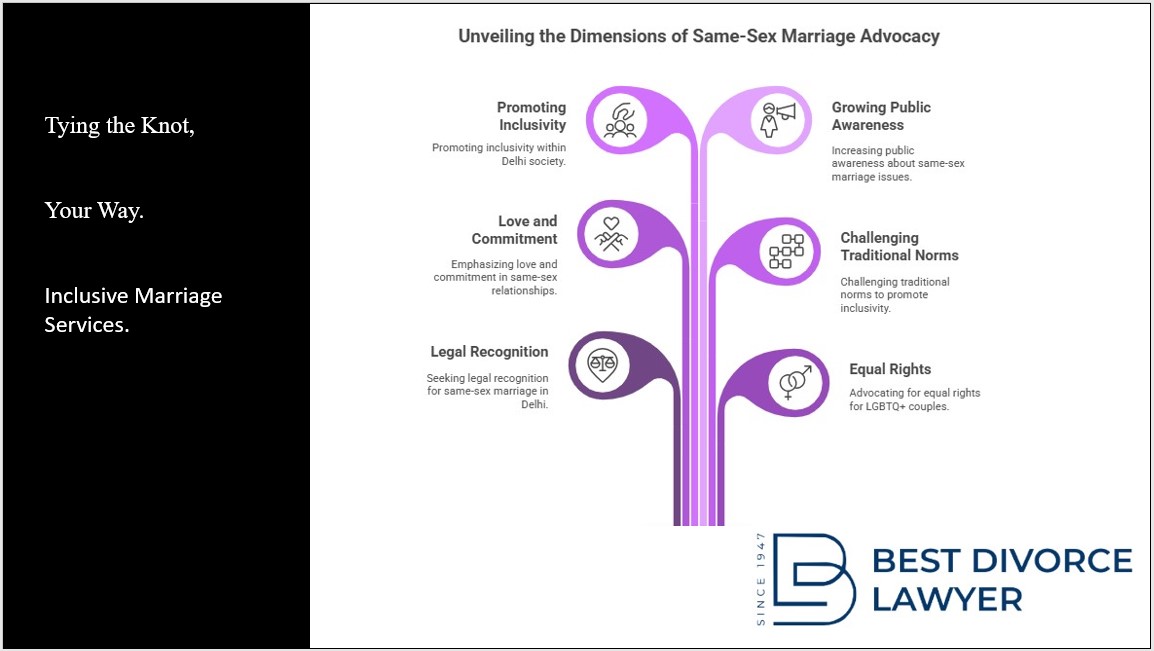Introduction
Same-sex marriage is a pressing issue in India, where legal, cultural, and social dynamics create a complex landscape for LGBTQ+ rights. In Delhi, the nation’s capital and a hub of activism and diversity, the push for same-sex marriage is particularly vibrant. As of June 2025, same-sex marriage is not legally recognized in India, but Delhi’s progressive environment and active judiciary make it a focal point for change. This blog explores the legal status of same-sex marriage in Delhi, key judicial developments, societal challenges, local support systems, and future prospects.

Current Legal Status of Same-Sex Marriage in Delhi
Marriage in India is governed by personal laws, including the Hindu Marriage Act, 1955, the Special Marriage Act, 1954, and religious laws for Muslims and Christians, all of which define marriage as a heterosexual union. In Delhi, a cosmopolitan city with a diverse population, these laws prevent same-sex couples from accessing legal marriage, denying them rights like inheritance, joint property ownership, and adoption. Delhi’s family courts, such as those in Saket and Tis Hazari, adhere to these laws, leaving same-sex couples reliant on informal arrangements like cohabitation agreements.
Delhi’s status as a political and judicial hub amplifies its role in the same-sex marriage debate, with local courts and activists pushing for reform. The city’s exposure to global ideas and active LGBTQ+ community, evident in events like the Delhi Queer Pride Parade, fuels demand for legal recognition.
Key Judicial Milestones Impacting Delhi
Delhi’s courts have been at the forefront of LGBTQ+ rights, with landmark judgments shaping the discourse:
- Navtej Singh Johar v. Union of India (2018): The Supreme Court, based in Delhi, decriminalized homosexuality by partially striking down Section 377 IPC. This ruling energized Delhi’s LGBTQ+ community, affirming their right to love but not addressing marriage.
- Supriyo v. Union of India (2023): The Supreme Court rejected petitions for same-sex marriage, deferring to Parliament but urging non-discrimination and social security benefits for same-sex couples. Delhi’s legal community has since pushed for legislative action.
- Transgender Persons (Protection of Rights) Act, 2019: This act, enforced in Delhi, allows transgender individuals to self-identify their gender, sparking discussions on gender-neutral marriage laws.
Personal Laws and Their Limitations in Delhi
Delhi’s diverse population adheres to various personal laws, all of which exclude same-sex marriage:
- Hindu Marriage Act, 1955: Defines marriage as a union between a bride and groom, limiting its scope in Delhi’s Hindu-majority areas like Rohini and Dwarka.
- Special Marriage Act, 1954: Specifies “male” and “female” partners, excluding same-sex couples in Delhi’s interfaith marriage processes.
- Muslim and Christian Laws: These laws, applied in areas like Old Delhi and Vasant Kunj, define marriage as heterosexual, rooted in religious doctrine.
Delhi’s family courts strictly enforce these laws, creating a significant barrier to same-sex marriage recognition.
Societal and Cultural Challenges in Delhi
Delhi’s social fabric, blending urban progressivism with pockets of conservatism, presents unique challenges:
- Religious Opposition: Major religions in Delhi, including Hinduism, Islam, and Christianity, traditionally view marriage as heterosexual, with resistance from religious leaders in areas like Jama Masjid.
- Family Expectations: Delhi’s middle-class families often prioritize arranged marriages, leading to stigma and pressure for same-sex individuals, particularly in conservative neighborhoods like Karol Bagh.
- Urban-Rural Divide: Central and South Delhi show growing acceptance through pride parades and queer-friendly spaces like Hauz Khas Village, but suburban areas like Najafgarh remain conservative Source: The Indian Express.
Delhi’s vibrant LGBTQ+ community, supported by organizations like the Naz Foundation, is countering these challenges through advocacy and awareness.
Legal Rights for Same-Sex Couples in Delhi
Despite the lack of marriage recognition, Delhi’s same-sex couples can access limited protections:
- Cohabitation Rights: The Supreme Court’s recognition of live-in relationships grants same-sex couples rights like shared tenancy in Delhi’s housing societies.
- Anti-Discrimination Protections: The Navtej Singh Johar ruling protects against harassment based on sexual orientation, applicable in Delhi’s workplaces and public spaces.
- Adoption and Succession: Joint adoption is not permitted, but individuals can adopt under the Juvenile Justice Act, 2015. Succession requires explicit wills to secure inheritance.
The Delhi Legal Services Authority (DLSA) assists same-sex couples in navigating these rights.
City-Specific Support Systems in Delhi
Delhi offers robust resources for same-sex couples:
- Delhi Legal Services Authority (DLSA): Provides free legal aid for LGBTQ+ individuals through its offices in Saket and Tis Hazari.
- NGOs and Support Groups: The Naz Foundation and Humsafar Trust’s Delhi chapters offer counseling, legal aid, and pride events like the Delhi Queer Pride Parade.
- Pride Events: The annual Delhi Queer Pride Parade in Connaught Place promotes visibility and advocacy.
Future Prospects for Same-Sex Marriage in Delhi
Delhi’s path to same-sex marriage legalization involves:
Challenges to Legalization
- Political Resistance: Delhi’s political parties may face conservative pushback.
- Religious Pushback: Religious institutions in Delhi oppose same-sex marriage.
- Legal Complexity: Harmonizing personal laws requires extensive reform.
Potential Pathways Forward
- Incremental Reforms: Granting cohabitation and inheritance rights as a precursor to marriage.
- Public Awareness: Leveraging Delhi’s media and cultural events like QFest to reduce stigma.
- International Influence: Global advocacy could shape Delhi’s policies.
Conclusion
The journey towards marriage equality for same-sex couples in India is a complex and evolving one. While the Supreme Court’s 2018 decriminalization of homosexuality was a landmark victory for LGBTQ+ rights, the subsequent decision in October 2023 to leave the legalization of same-sex marriage to Parliament highlights the ongoing challenges. Delhi’s progressive environment and active judiciary position it as a leader in the fight for same-sex marriage. With support from DLSA and NGOs, the city is paving the way for change.
For legal assistance, call +91 9461620006 or visit www.bestdivorcelawyer.in today!


